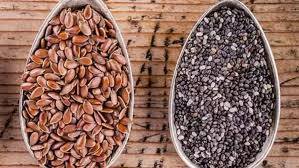Chia Seeds vs. Flax Seeds: Which Is Healthier?
When it comes to superfoods, chia seeds and flax seeds are often at the forefront of health discussions. Both seeds are rich in nutrients and offer numerous health benefits, but they differ in their nutritional profiles and effects on the body. This article will explore the differences between these two seeds to determine which might be healthier.
Nutritional Overview
Chia Seeds
Chia seeds are tiny black or white seeds derived from the Salvia hispanica plant. They are an excellent source of omega-3 fatty acids, fiber, protein, and various essential minerals, including calcium, magnesium, and phosphorus. Just two tablespoons of chia seeds contain approximately:
- Calories: 140
- Protein: 4g
- Fat: 9g (of which 5g are omega-3 fatty acids)
- Fiber: 11g
- Calcium: 18% of the Daily Value (DV)
- Magnesium: 30% of the DV
Flax Seeds
Flax seeds come from the flax plant (Linum usitatissimum) and are available in brown and golden varieties. They are also rich in omega-3 fatty acids, fiber, and lignans, which are plant compounds with antioxidant properties. Two tablespoons of flax seeds provide approximately:
- Calories: 150
- Protein: 5g
- Fat: 12g (of which 6g are omega-3 fatty acids)
- Fiber: 8g
- Calcium: 4% of the DV
- Magnesium: 28% of the DV
Health Benefits
Omega-3 Fatty Acids
Both seeds are excellent sources of alpha-linolenic acid (ALA), a type of omega-3 fatty acid. Omega-3s are crucial for heart health, reducing inflammation, and supporting brain function. Flax seeds contain slightly higher omega-3 content per serving, making them a potent choice for those focused on heart health.
Fiber Content
Chia seeds are particularly high in soluble fiber, which can help regulate blood sugar levels, improve digestive health, and promote a feeling of fullness. This can be beneficial for weight management. Flax seeds also contain fiber, but they offer a more balanced ratio of soluble to insoluble fiber.
Protein
Both seeds provide a good amount of protein, but flax seeds have a slight edge. This makes them a valuable addition to vegetarian and vegan diets, as they can help meet daily protein needs.
Antioxidants and Lignans
Flax seeds are particularly rich in lignans, which have antioxidant properties and may help reduce the risk of certain cancers. Chia seeds contain some antioxidants as well, but their focus is more on fiber and omega-3 content.
Versatility in Diet
Chia seeds are known for their ability to absorb water and expand, forming a gel-like consistency. This property makes them a popular ingredient in smoothies, puddings, and baked goods. They can also be sprinkled on salads or oatmeal for added texture.
Flax seeds are often ground into meal to enhance nutrient absorption, as whole flax seeds can pass through the digestive system undigested. Flaxseed meal can be used in baking or added to smoothies, cereals, and yogurt.
Potential Drawbacks
While both seeds are generally safe for most people, excessive consumption can lead to digestive issues due to their high fiber content. It's recommended to start with small amounts and increase gradually.
Flax seeds contain phytoestrogens, which can affect hormonal balance in some individuals. Those with hormone-sensitive conditions should consult a healthcare provider before adding flax seeds to their diet.
Conclusion
Both chia seeds and flax seeds are nutritional powerhouses, but their health benefits cater to different needs. If you're looking for higher omega-3 content and antioxidants, flax seeds may be the better choice. On the other hand, if you want a higher fiber content and versatility in food applications, chia seeds might be more beneficial. Ultimately, incorporating both seeds into your diet can provide a well-rounded array of health benefits.


